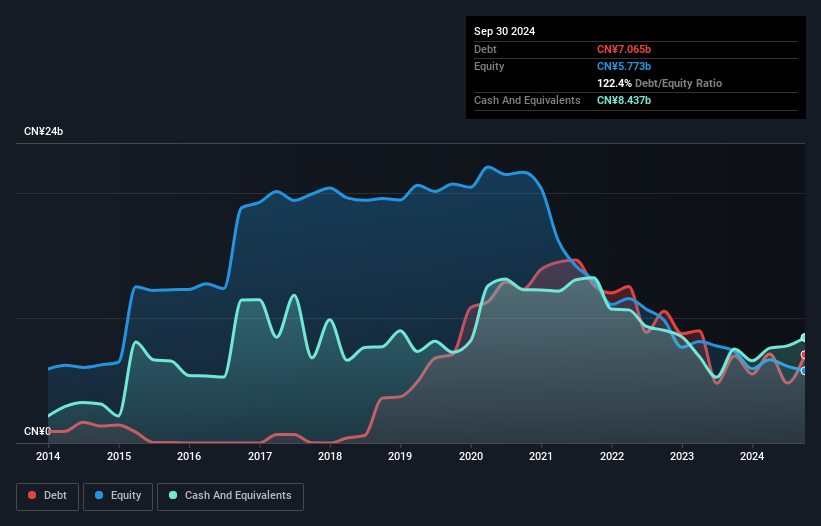- China
- /
- Food and Staples Retail
- /
- SHSE:601933
Health Check: How Prudently Does Yonghui Superstores (SHSE:601933) Use Debt?
Some say volatility, rather than debt, is the best way to think about risk as an investor, but Warren Buffett famously said that 'Volatility is far from synonymous with risk.' So it seems the smart money knows that debt - which is usually involved in bankruptcies - is a very important factor, when you assess how risky a company is. Importantly, Yonghui Superstores Co., Ltd. (SHSE:601933) does carry debt. But the real question is whether this debt is making the company risky.
When Is Debt Dangerous?
Debt is a tool to help businesses grow, but if a business is incapable of paying off its lenders, then it exists at their mercy. Part and parcel of capitalism is the process of 'creative destruction' where failed businesses are mercilessly liquidated by their bankers. However, a more frequent (but still costly) occurrence is where a company must issue shares at bargain-basement prices, permanently diluting shareholders, just to shore up its balance sheet. Of course, debt can be an important tool in businesses, particularly capital heavy businesses. When we think about a company's use of debt, we first look at cash and debt together.
View our latest analysis for Yonghui Superstores
What Is Yonghui Superstores's Net Debt?
As you can see below, Yonghui Superstores had CN¥7.07b of debt, at September 2024, which is about the same as the year before. You can click the chart for greater detail. However, its balance sheet shows it holds CN¥8.44b in cash, so it actually has CN¥1.37b net cash.

A Look At Yonghui Superstores' Liabilities
The latest balance sheet data shows that Yonghui Superstores had liabilities of CN¥22.6b due within a year, and liabilities of CN¥16.5b falling due after that. Offsetting these obligations, it had cash of CN¥8.44b as well as receivables valued at CN¥931.6m due within 12 months. So its liabilities total CN¥29.7b more than the combination of its cash and short-term receivables.
This is a mountain of leverage relative to its market capitalization of CN¥49.4b. This suggests shareholders would be heavily diluted if the company needed to shore up its balance sheet in a hurry. While it does have liabilities worth noting, Yonghui Superstores also has more cash than debt, so we're pretty confident it can manage its debt safely. There's no doubt that we learn most about debt from the balance sheet. But it is future earnings, more than anything, that will determine Yonghui Superstores's ability to maintain a healthy balance sheet going forward. So if you're focused on the future you can check out this free report showing analyst profit forecasts.
Over 12 months, Yonghui Superstores made a loss at the EBIT level, and saw its revenue drop to CN¥71b, which is a fall of 13%. We would much prefer see growth.
So How Risky Is Yonghui Superstores?
Although Yonghui Superstores had an earnings before interest and tax (EBIT) loss over the last twelve months, it generated positive free cash flow of CN¥2.4b. So although it is loss-making, it doesn't seem to have too much near-term balance sheet risk, keeping in mind the net cash. Until we see some positive EBIT, we're a bit cautious of the stock, not least because of the rather modest revenue growth. When analysing debt levels, the balance sheet is the obvious place to start. But ultimately, every company can contain risks that exist outside of the balance sheet. To that end, you should be aware of the 1 warning sign we've spotted with Yonghui Superstores .
If you're interested in investing in businesses that can grow profits without the burden of debt, then check out this free list of growing businesses that have net cash on the balance sheet.
New: Manage All Your Stock Portfolios in One Place
We've created the ultimate portfolio companion for stock investors, and it's free.
• Connect an unlimited number of Portfolios and see your total in one currency
• Be alerted to new Warning Signs or Risks via email or mobile
• Track the Fair Value of your stocks
Have feedback on this article? Concerned about the content? Get in touch with us directly. Alternatively, email editorial-team (at) simplywallst.com.
This article by Simply Wall St is general in nature. We provide commentary based on historical data and analyst forecasts only using an unbiased methodology and our articles are not intended to be financial advice. It does not constitute a recommendation to buy or sell any stock, and does not take account of your objectives, or your financial situation. We aim to bring you long-term focused analysis driven by fundamental data. Note that our analysis may not factor in the latest price-sensitive company announcements or qualitative material. Simply Wall St has no position in any stocks mentioned.
About SHSE:601933
Undervalued with moderate growth potential.
Market Insights
Community Narratives



